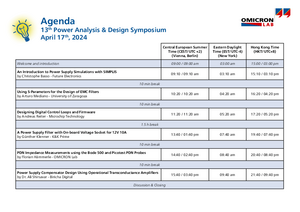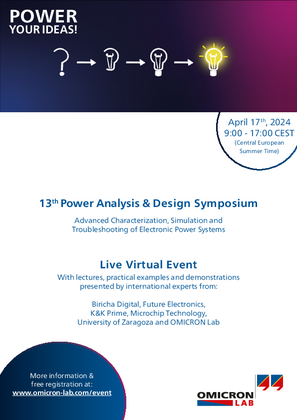13th Power Analysis & Design Symposium 2024 (VIRTUAL)
The OMICRON Lab Power Analysis & Design Symposium is an annual event focusing on advanced characterization, simulation, and troubleshooting of board-level power-electronic systems. International experts from the field include practical examples and demonstrations in their lectures.

The 13th Power Analysis & Design Symposium took place as a live, virtual event on Wednesday, April 17th, 2024.
No matter if you had time to attend the symposium or not, for your convenience we made all presentations available - below you will find the presentation pdf and the recording for each topic.
Seminar Topics
An Introduction to Power Supply Simulations with SIMPLIS
by Christophe Basso - Future Electronics
A simulation engine is a convenient and powerful tool when designing switching power supplies. If many simulation engines are available nowadays, few can deliver all the needed information to design the entire circuit: SPICE is a valuable assistant but it is prone to convergence issues and has difficulties with long-run PFC simulations. Besides, you need to resort to an equivalent small-signal model to explore a compensation strategy to close the feedback loop safely. If this is easy for the basic switching cells, the exercise complicates when no average model exists, like in the LLC converter case, for instance. SIMPLIS, on the other hand, builds on a different simulation engine and lets you simulate at a quicker speed than SPICE. Furthermore, it can extract the small-signal response of any switching converter. This seminar offers an introduction to how SIMPLIS operates compared to SPICE and how it can improve your design cycle in control loop design.
This seminar targets switching power supply designers and requires an intermediate background in simulation.
Download the presentation
Watch the recording

Using S-Parameters for the Design of EMC Filters
by Arturo Mediano - University of Zaragoza
This is a talk to explain to non-RF engineers what s-parameters are, how you can measure them using a vector network analyzer like the Bode 100 or Bode 500, how to apply them in EMC filter characterization, and how to export data for simulation (i.e. LTSPICE) to evaluate the effect of different terminal impedances.
Download the presentation
Watch the recording

Designing Digital Control Loops and Firmware
by Andreas Reiter - Microchip Technology
Over the past 15 years, digital control of power supplies has conquered specific markets and applications. Although this approach provides a wide range of new capabilities required to enable new technologies, such as driving new, complex converter topologies or solving system-level challenges in hyper-adaptive power distribution networks, it also introduces a significant number of design challenges on its own.
In this session we will cover common practices and tools used in the design process of software-based, digital control systems. In short live demos we will learn how to derive plant transfer functions using simulation and bench measurements, how to close the feedback loop in software, and how to use extended simulation to test and validate the complete control software using Model-Oriented Design tools.
Download the presentation
Watch the recording

A Power Supply Filter with On-board Voltage Socket for 12V 10A
by Günther Klenner - K&K Prime
Our customer with a portable, battery-powered device sold his system for an in-car use. He said: “We just need a cable with an on-board 12V voltage socket,” and the project started. Join me on our way through the whole chain of developing such a filter. The project includes setting up the specifications, selecting the components, performing SPICE simulations, considering the Middlebrook stability criteria, placing the components on the PCB, designing a housing using 3D printing, and verifying the final results using the Bode 100.
Download the presentation
Watch the recording
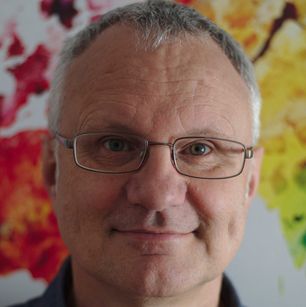
PDN Impedance Measurements using the Bode 500 and Picotest PDN Probes
by Florian Hämmerle - OMICRON Lab
The power delivery network (PDN) describes the complete system delivering the power from the power source (i.e. a battery or a AC/DC power supply) to the power sink (i.e. a processor or FPGA). The PDN must be able to provide a sufficiently low source impedance such that the voltage drop does not exceed the limits when the maximum current is flowing. The faster the current transients, the more challenging this gets. Adding decoupling capacitors to the PDN helps to provide a low impedance over a wide frequency range but also brings the risk of resonance peaks in the PDN. A simple PDN impedance measurement can help in verifying the PDN design. It will reveal critical resonances that could lead to system failures. This presentation will cover the basics of dynamic output impedance and PDN impedance, focusing on measuring low impedance using the Bode 500 in conjunction with Picotest PDN probes.
Download the presentation
Watch the recording
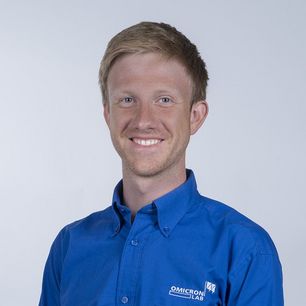
Power Supply Compensator Design Using Operational Transconductance Amplifiers
by Dr. Ali Shirsavar - Biricha Digital
The design of compensators with standard voltage error amplifiers, i.e., a typical operational amplifier (op-amp), is well documented in many books, application notes, design examples, and even automated software. What received less attention is compensator design using operational transconductance amplifiers (OTAs). Unfortunately, our PWM controller IC often contains only an internal transconductance op-amp, leaving us no choice. In this session, Dr. Ali Shirsavar from Biricha Digital will demystify how this particular op-amp operates and explain in simple terms how we design PSU compensators for stable operation down to the component level. As always, simulations and experimental results will be presented.
All attendees will receive a six-month free license for Biricha WDS automated power supply design software, which includes OTA compensator design.
Download the presentation
Watch the recording
Get to know the Experts
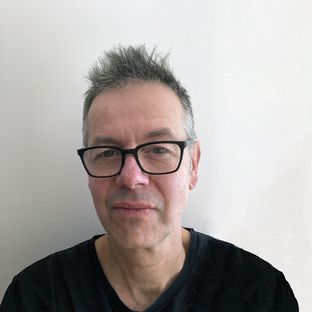
Christophe Basso is a Business Development Manager at Future Electronics in Toulouse, France, covering EMEA. Previously, at Onsemi, he led an application team dedicated to developing new offline PWM controller’s specifications. He has originated numerous integrated circuits among which the NCP120X series has set new standards for low standby power converters. He holds 25 patents on power conversion.
Christophe has published numerous books on power supply design and, in particular, small-signal modeling with his title from 2021, Transfer Functions of Switching Converters. He taught many public and private seminars world-wide but also during the IEEE-sponsored conference APEC in the US.
Christophe has over 25 years of power supply industry experience. Prior to joining Future Electronics in 2021, Christophe was a Technical Fellow at Onsemi and an application engineer for Motorola Semiconductor in Toulouse. Before 1997, he worked at the European Synchrotron Radiation Facility in Grenoble, France, for 10 years. He holds a diplôme universitaire de technologie from Montpellier University (France) and an MSEE from the Institut National Polytechnique of Toulouse (France). He is an IEEE Senior member.

Arturo Mediano is the founder of The HF-Magic Lab®, a specialized laboratory for design, diagnostic, troubleshooting, and training in the EMI/EMC, Signal Integrity, and RF fields at I3A (University of Zaragoza).
He received his M.Sc. (1990) and his Ph. D. (1997) in Electrical Engineering from the University of Zaragoza (Spain), where he has held a teaching professorship in EMI/EMC/RF/SI since 1992.
For more than 30 years Arturo has been involved in R&D projects with many companies in the EMI/EMC, Signal Integrity and RF fields for communications, industry, medical, and scientific applications. He regularly shares his knowledge and expertise with students and engineers in teaching courses and seminars.

Andreas Reiter studied Micro and Nanotechnology and graduated with a Physics degree from the Munich University of Applied Sciences. His professional career brought him from nano mechanics to solid-state physics, thermo dynamics and finally to power conversion. Since 2005, Andreas is focusing on intelligent power conversion applications. Since more than 11 years, he is working with Microchip where is is leading the power conversion applications group, acting as a bridge between semiconductor development and end-customers applications.
His specialties are digital power supplies, switching power supplies and embedded control design and programming.
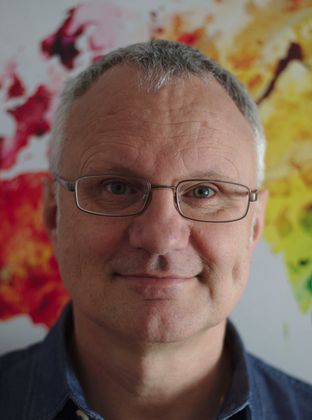
Günther Klenner is head of research & development at KK-Prime, a design house for electronics development, especially in the RF field. The field of application ranges from EMC to microwave, medical devices to component testers and antenna design to circuit support. He bases on more than 40 years of experience in the RF area from various fields of activity as a system SW engineer, project manager, product manager at Kathrein, Rohde&Schwarz, Acterna and Wireless Telecom Group before founding KK-Prime in 2009.
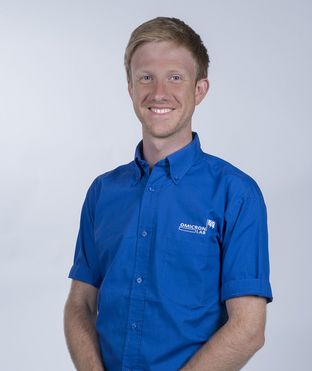
Florian Hämmerle went to the Bregenz Electrical Engineering College (HTL). After that, he studied Mechatronics at the University of Applied Sciences Vorarlberg (FHV), where he carried out his Master thesis "Simulation and Characterization of a Miniaturized Planar Coil" at the Research Center for Microtechnology.
Since 2010, Florian is working at OMICRON Lab with a strong focus on power electronics applications for the Bode 100 VNA.
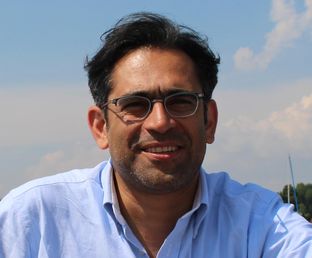
Dr. Ali Shirsavar founded Biricha Digital Power over a decade ago. Prior to that he was a senior academic a leading UK university specialising in Power Electronics. He is well known throughout our industry for his excellent training workshops on power supply design and EMC.
Agenda
| Time | ||||
| Topic | Speakers | Central European Time (CEST/UTC +2) (Vienna, Berlin) | Eastern Daylight Time (EDT/UTC-4) (New York) | Hong Kong Time (HKT/UTC+8) |
| Welcome & Introduction | OMICRON Lab | 09:00 / 09:00 am | 03:00 am | 15:00 / 03:00 pm |
| An Introduction to Power Supply Simulations with SIMPLIS | Christophe Basso - Future Electronics | 09:10 / 09:10 am | 03:10 am | 15:10 / 03:10 pm |
| Using S-Parameters for the Design of EMC Filters | Arturo Mediano - University of Zaragoza | 10:20 / 10:20 am | 04:20 am | 16:20 / 04:20 pm |
| Designing Digital Control Loops and Firmware | Andreas Reiter - Microchip Technology | 11:20 / 11:20 am | 05:20 am | 17:20 / 05:20 pm |
| A Power Supply Filter with On-board Voltage Socket for 12V 10A | Günther Klenner - K&K Prime | 13:40 / 01:40 pm | 07:40 am | 19:40 / 07:40 pm |
| PDN Impedance Measurements using the Bode 500 and Picotest PDN Probes | Florian Hämmerle - OMICRON Lab | 14:40 / 02:40 pm | 08:40 am | 20:40 / 08:40 pm |
| Power Supply Compensator Design Using Operational Transconductance Amplifiers | Dr. Ali Shirsavar - Biricha Digital | 15:40 / 03:40 pm | 09:40 am | 21:40 / 09:40 pm |

